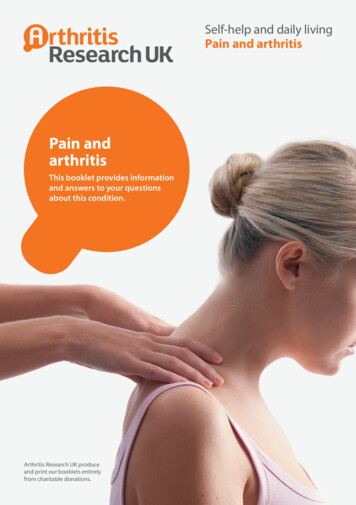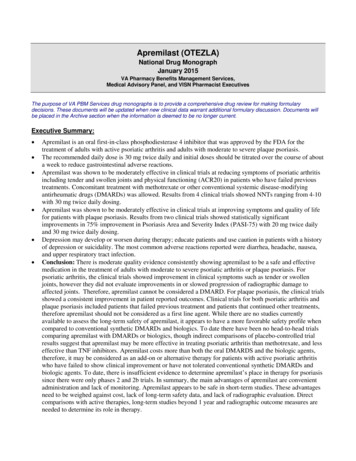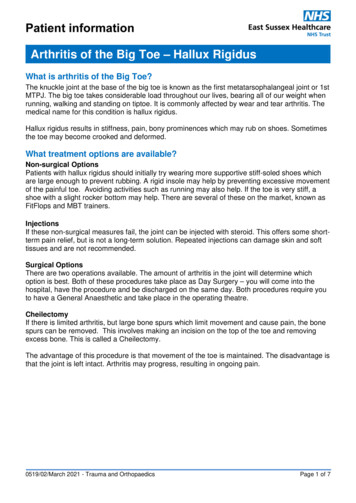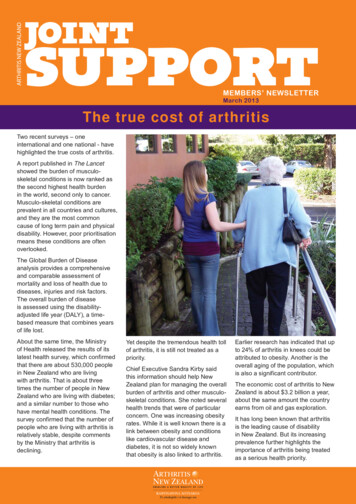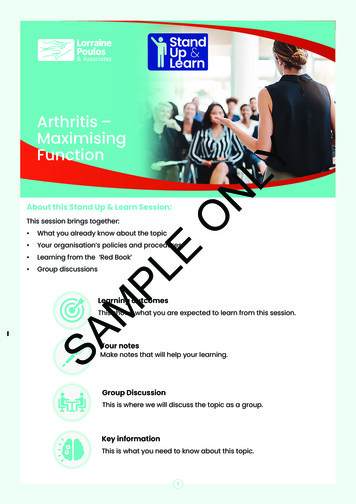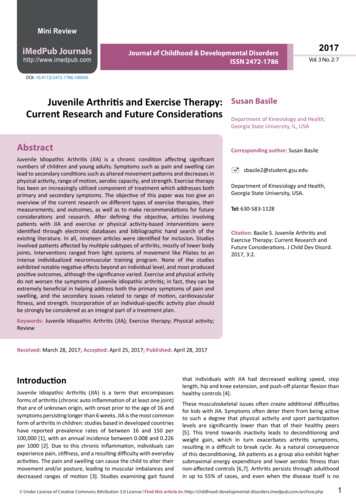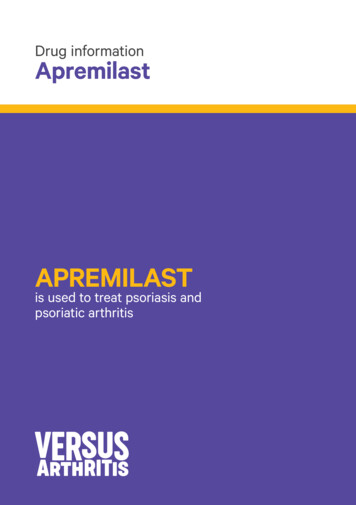
Transcription
Drug informationApremilastAPREMILASTis used to treat psoriasis andpsoriatic arthritis
Apremilast information bookletIntroductionApremilast is a drug that can help prevent your condition causingdamage to your body. You can discuss the benefits and risks oftaking apremilast with healthcare professionals before you starttreatment, so you’re able to make an informed decision.What is apremilast and how is it used?Apremilast (trade name Otezla) is used to treat psoriasis(saw-rye-a-sis) and psoriatic arthritis (saw-ree-at-ik arth-ri-tis). It’s atype of disease-modifying anti-rheumatic drug (DMARD). It targetsan enzyme called PDE4, which is involved in the inflammatoryprocesses that cause the symptoms of these conditions.Apremilast has been shown to reduce symptoms such as swollenand tender joints and to improve skin symptoms, including scalpand nail psoriasis. If apremilast works for you, you should start tonotice the benefits within four months of starting the treatment.Apremilast can be prescribed by a consultant or other clinicalspecialist in rheumatology for adults with psoriatic arthritis. Itcan be used alone or with other disease-modifying drugs such asmethotrexate. You won’t be given apremilast if you haven’t triedother treatments appropriate for your condition first.Is apremilast suitable for me?Your doctor may decide not to prescribe this treatment if: you’re underweight you have symptoms of depression you’re pregnant or planning to try for a baby.Apremilast contains lactose, a type of sugar normally found indairy products. This medicine may not be suitable for you if youhave a lactose intolerance, which means that you can’t digestlactose normally.When and how do I take apremilast?Apremilast is taken as tablets. They can be taken with orwithout food.When you first start taking apremilast, you’ll be given a specialstarter pack which contains all the doses for the first six days. You’llonly be given the starter pack once – even if you stop and thenrestart the treatment. The pack is clearly labelled to make sure youtake the right dose at the right time, starting with a low dose andworking up to the maximum.Once you’ve finished the starter pack, you’ll remain on the higherdose. Most people will take one tablet in the morning and one in theevening. However, if you have kidney problems, your specialist maysuggest just taking one tablet a day.If you miss a dose, contact your specialist team immediately foradvice on when to take the next one.Because apremilast is a long-term treatment, it’s important to keeptaking it, unless you have severe side-effects: even if it doesn’t seem to be working at first even when your symptoms improve (to help keep your conditionunder control).Your doctor may decide to stop the treatment after four months ifthere hasn’t been enough improvement in your symptoms.Your doctor will assess your condition and may decide to do sometests, for example kidney function tests, before starting treatment.Page 2 of 8Helpline 0800 5200 520Page 3 of 8
Apremilast information bookletPossible risks and side effectsLike any medicine, apremilast can cause side effects but manypeople won’t have any problems. You should speak to yourrheumatology team if you’re worried about side effects.Common side effects include diarrhoea (die-a-ree-ah), feeling sick,and coughs and colds. These mostly occur within a few weeks ofstarting apremilast treatment and are usually mild enough to clearup without any special treatment.Some people may have stomach pain, loss of appetite, or headaches.If you pick up an infection while you’re on apremilast, speak to yourrheumatology team. If the infection is serious, you may need to stoptaking apremilast until you’re better.You should discuss any side effects with your specialist, butin particular: feelings of depression or suicidal thoughts: These are very rareside effects but can be very serious, so contact your doctorstraight away. loss of weight: Tell your doctor if you have unexplained orsignificant weight loss after starting apremilast. It may be bestfor you not to continue the treatment.Tips to reduce your risk of infection Try to avoid close contact with people you know havean infection. Wash your hands regularly and carry around a small bottle ofantibacterial hand gel. Keep your mouth clean by brushing your teeth regularly. Stop smoking if you’re a smoker. Make sure your food is stored and prepared properly. Try to keep your house clean and hygienic, especially thekitchen, bathrooms and toilets.Taking other medicinesYou may be taking other disease-modifying drugs as well asapremilast. However, apremilast can interact with some medicines,so check with your doctor or a pharmacist before starting any newmedicines. Remember to mention you’re on apremilast if you’retreated by anyone other than your usual rheumatology team.You can carry on taking non-steroidal anti-inflammatory drugs(NSAIDs) or painkillers, if needed, unless your doctor tells youotherwise.Don’t take over-the-counter or herbal medicines without discussingit first with your doctor. Some of these, including St John’s Wort,can interfere with the treatment.Page 4 of 8Helpline 0800 5200 520Page 5 of 8
Apremilast information bookletVaccinationsIt’s best to discuss vaccinations, including any you may need ifyou’re planning to travel abroad, with your healthcare team. Ifpossible, it’s best to have any vaccinations you may need before youstart apremilast.Live vaccines aren’t usually recommended for people who arealready on apremilast. These include yellow fever, shingles, rubellaand oral polio vaccines.Having an operationIf you’re thinking about having surgery, check with yourrheumatology team and surgeon about whether you should stoptaking apremilast for a time before and after surgery.AlcoholThere’s no known interaction between apremilast and alcohol.However, alcohol can make psoriasis worse, so it’s best to keep wellwithin the recommended limits of no more than 14 units of alcoholper week for adults.This is also recommended if you’re taking methotrexate alongsideapremilast, because methotrexate and alcohol can interact andaffect your liver. In some circumstances your doctor may adviselower limits for alcohol intake.Similarly, because we don’t yet know if the drug can pass intohuman breast milk, you shouldn’t take apremilast if you’rebreastfeeding.There’s currently no information on whether apremilast might affectmale or female fertility.This leaflet is a guide to apremilast, its benefits and potentialside effects. If there’s anything else you’d like to know aboutthis drug, just ask the healthcare professionals in charge ofyour care.Thank you!A team of people helped us create this booklet. We would like tothank Paul Creamer, Emily Rose-Parfitt and Mohammed Akil forhelping us with reviewing this booklet.We would also like to give a special thank you to the peoplewho shared their opinions and thoughts on the booklet. Yourcontributions make sure the information we provide is relevantand suitable for everyone.Fertility, pregnancy and breastfeedingThere’s limited information available about the possible effectsof apremilast in pregnancy. Women who could become pregnantshould use effective contraception while being treated withapremilast. If you’re planning to try for a baby or if you’re alreadypregnant, your doctor won’t prescribe apremilast.Page 6 of 8Helpline 0800 5200 520Page 7 of 8
Versus ArthritisCopeman HouseSt Mary’s CourtSt Mary’s GateChesterfield S41 7TDTel 0300 790 0400calls charged at standard is.orgFollow us:Registered Charity No 207711Scotland No SC041156 Versus Arthritis 2020VA2283
Apremilast information booklet Page 2 of 8 Page 3 of 8. Helpline 80 20 20 Possible risks and side effects Like any medicine, apremilast can cause side effects but many people won't have any problems. You should speak to your rheumatology team if you're worried about side effects.
